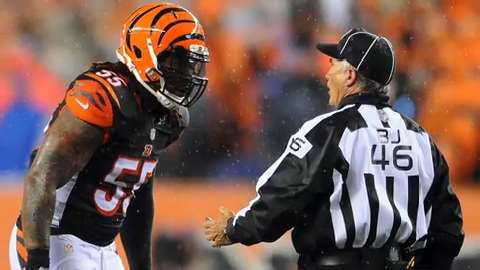Bengals' Burfict gets off too easy: Our view
NFL won't stop dirty hits on players until it deals more harshly with repeat offenders.

A horrific hit late in the Cincinnati Bengals-Pittsburgh Steelers playoff game Saturday provided a timely test of the NFL's commitment to making the game safer.
The NFL's punishment announced Monday night — a three-game suspension without pay of Bengals' linebacker Vontaze Burfict for his vicious hit on Steelers star receiver Antonio Brown — is more than other players have gotten but insufficient to deter the league's repeat offenders.
The scary shoulder-to-helmet slam on Brown undoubtedly sent a shudder through anyone who has watched the film Concussion, playing on hundreds of screens across the country.
The film’s central truth is that the giant entertainment-sports juggernaut known as the NFL did its best for years to deny an avalanche of evidence that jarring head hits contribute to diseases that wreak havoc on players’ brains, often on men far too young to be suffering from memory-erasing illnesses.
The movie focuses on Pittsburgh pathologist Bennet Omalu (played by Will Smith), who helped expose brain injuries in pro players, starting with retired Steelers. Omalu's findings — and the ruckus he, other scientists and members of Congress made — finally forced the NFL to face facts.
To his credit, Commissioner Roger Goodell has made some progress in trying to make an inherently violent game a little less dangerous.
Under the league’s “concussion protocol,” players are no longer rushed back into games prematurely after concussions. While that helps protect players from further injury, it also often works to the competitive disadvantage of the victims.
More important than the post-concussion protocol is preventing head injuries in the first place, particularly those caused by dirty hits.
The league has issued hundreds of thousands of dollars in fines and nine players have served suspensions, usually for a game or two, for what it calls on-field violations of player safety rules. But if the NFL were really serious about penalizing repeat offenders and discouraging vicious behavior, bad actors such as Burfict would face something harsher.
Even before Monday, Burfict had racked up more than $145,000 in fines since 2013 for what can only be called cheap shots on the field. Given that Burfict received $6.9 million in guarantees on a three-year contract extension in 2014, the fines weren't much of a deterrent.
In a game against the Baltimore Ravens a week earlier, Burfict executed a violent blow to the helmet of Ravens rookie tight end Maxx Williams. After that play, Burfict shouldn’t have even been on the field in Saturday’s game, which, by the way, the Bengals lost 18-16, after Burfict’s penalized hit on Brown helped open the way for the game-winning Pittsburgh field goal.
If the NFL wanted to send the right message, Burfict would have been suspended for far longer than the first three weeks of the 2016 regular season.
When the NFL acts, it affects not only how the pros perform but also how millions of high school and college players conduct themselves on the field as they emulate their heroes. It’s not enough simply to acknowledge that concussions are serious. The league has to show that players and teams will pay a high and painful price for causing them.
Paste BN's editorial opinions are decided by its Editorial Board, separate from the news staff. Most editorials are coupled with an opposing view — a unique Paste BN feature.
To read more editorials, go to the Opinion front page or sign up for the daily Opinion e-mail newsletter.